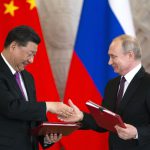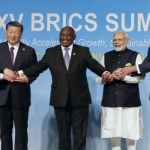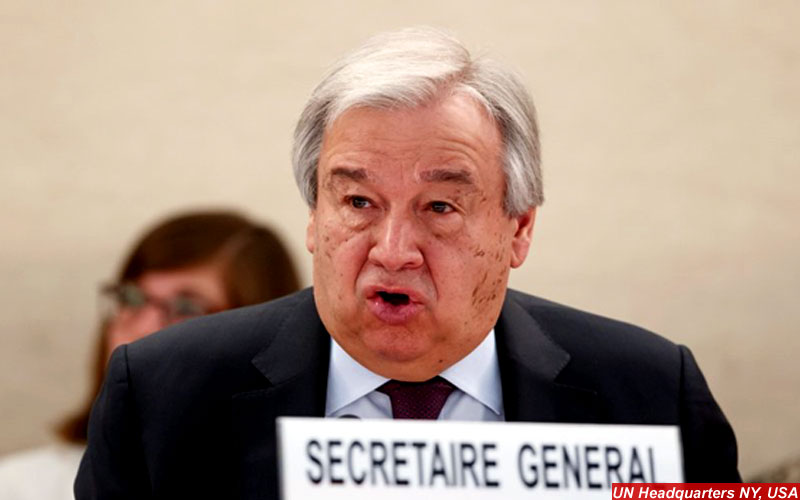
UNITED NATIONS (AP) — U.N. Secretary-General Antonio Guterres warned Tuesday that the world faces the most challenging crisis since World War II, confronting a pandemic threatening people in every country, one that will bring a recession “that probably has no parallel in the recent past.”
There is also a risk that the combination of the disease and its economic impact will contribute to “enhanced instability, enhanced unrest, and enhanced conflict,” the U.N. chief said at the launch of a report on the socioeconomic impacts of COVID-19.
Guterres called for a much stronger and more effective global response to the coronavirus pandemic and to the social and economic devastation that COVID-19 is causing.
He stressed that this will only be possible “if everybody comes together and if we forget political games and understand that it is humankind that is at stake.”
“We are facing a global health crisis unlike any in the 75-year history of the United Nations — one that is killing people, spreading human suffering, and upending people’s lives,” the report said. “But this is much more than a health crisis. It is a human crisis. The coronavirus disease (COVID-19) is attacking societies at their core.”
The secretary-general told reporters: “The magnitude of the response must match the scale of the crisis — large-scale, coordinated and comprehensive, with country and international responses being guided by the World Health Organization.”
He stressed that “we are still very far from where we need to be to effectively fight the COVID-19 worldwide and to be able to tackle the negative impacts on the global economy and the global societies.”
First, he said, many countries are not respecting WHO guidelines, with each tending to go its own way in dealing with the pandemic.
“Let us remember that we are only as strong as the weakest health system in our interconnected world,” he said. “It is essential that developed countries immediately assist those less developed to bolster their health systems and their response capacity to stop transmission.”
Secondly, he said, while $5 trillion has been mobilized, most of that money was by the developed world — including $2 trillion in the United States — to support their own economies from the consequences of the pandemic.
“We are far from having a global package to help the developing world to create the conditions both to suppress the disease and to address the dramatic consequences in their populations, in the people that lost their jobs, the small companies that are operating and risk to disappear, those that live with the informal economy that now have no chance to survive,” he said. “Massive support to the developing world is still required.”
The report also cites International Labor Organization estimates for 2020 that between 5 million and 25 million jobs will be lost, with a corresponding loss of between $860 million and $3.4 trillion in labor income. It also cited an estimate by the U.N. trade and development organization UNCTAD of a 30-40 percent “downward pressure” on global foreign direct investment flows this year.
Guterres announced the establishment of a COVID-19 Response and Recovery Fund to support efforts in low- and middle-income countries, with the aim of swiftly enabling governments to tackle the crisis and promote recovery.
He expressed hope that there will be “a positive response” from the international community to help vulnerable people including the tens of millions of refugees and internally displaced people, those in the slums of big cities in the global south, and poor people in middle-income countries who are more numerous than in the least developed countries.
The secretary-general said developed countries must massively increase the resources available to the developing world by expanding the capacity of the IMF to issue special drawing rights, and enabling other international financial institutions to rapidly inject resources into countries that need them.
Guterres said he strongly supports an idea from French President Emmanuel Macron, Russian President Vladimir Putin and German Chancellor Angela Merkel at last week’s summit of the Group of 20 major industrialized nations that there should be a G20 initiative to help Africa.
“But, again, we must act quickly to make it happen,” he said. “If not, the African continent will have enormous difficulties in facing this challenge.”
__
UN council holds first video briefings of coronavirus era
The U.N. Security Council held its first video conference briefings of the coronavirus era Tuesday on the U.N. peacekeeping mission in Congo, and recognized the improving political and security situation in most parts of the country except the volatile mineral-rich east.
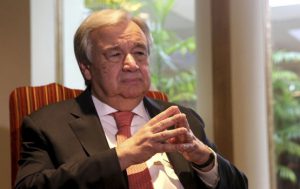
The council meeting, the first since March 12, was held without any prior notice to the media, apparently as a trial run ahead of a session on Thursday where several resolutions are expected to be adopted. Diplomats said there were some technical glitches on Tuesday and no decision has yet been made about how Thursday’s meeting will be conducted.
The U.N. headquarters complex overlooking New York’s East River is open and Secretary-General Antonio Guterres has been working in his 38th floor office, but a building which on a normal day gets about 11,000 swipes of passes of staff going in or out got only 51 swipes by 11 a.m. on Tuesday, with the overwhelming majority of people working from home.
According to diplomats, the Security Council’s closed virtual meeting lasted about four hours and included briefings by Leila Zerrougui, the U.N. envoy for Congo, and U.N. peacekeeping chief Jean-Pierre Lacroix as well as a discussion on how the U.N.’s most powerful body will conduct its business during the COVID-19 pandemic.
There has been growing pressure to reduce the size of the more than 18,000-strong U.N. peacekeeping mission in Congo, known as MONUSCO.
Guterres said “MONUSCO has begun consultations with the Government on a strategic dialogue to ensure that the draw down and exit are carefully sequenced” to sustain gains of the past two decades. The council encouraged the government to work with its members and the U,N, Secretariat on “a joint strategy and benchmarks for draw down.”
Congo’s President Felix Tshisekedi has been in office since January 2019 and Secretary-General Antonio Guterres said in a report to the council circulated Tuesday that the coalition government, including his supporters and a coalition backing his predecessor Joseph Kabila, “remained relatively stable,” noting its timely approval to the 2020 state budget. “Nevertheless, a number of high-profile public statements continued to signal underlying tensions,” the U.N. chief said.
The Security Council echoed Guterres’ concerns about ongoing violence in the east, where dozens of armed groups are active. Tens of thousands of people have fled fighting, which also complicated the global response to an Ebola outbreak in the region.
Guterres welcomed “the recent milestone of releasing the last Ebola patient from treatment” but urged vigilance until the virus’s complete eradication is assured. The Security Council also welcomed progress on combating the Ebola virus, noting the absence of new cases over the last month.
Council members also welcomed steps taken by Congolese authorities to contain the COVID-19 pandemic.
__
UN chief urges G20 to adopt `war-time’ plan with trillions
U.N. Secretary-General Antonio Guterres urged leaders of the world’s 20 major industrialized nations on Tuesday to adopt a “wartime” plan including a stimulus package “in the trillions of dollars” for businesses, workers and households in developing countries trying to tackle the coronavirus pandemic.
He said in a letter to the Group of 20 leaders that they account for 85 percent of the world’s gross domestic product and have “a direct interest and critical role to play in helping developing countries cope with the crisis.”
“Let us remember that we are only as strong as the weakest health system in our interconnected world,” the U.N. chief said. “We must create the conditions and mobilize the resources necessary to ensure that developing countries have equal opportunities to respond to this crisis in their communities and economies.”
Guterres warned: “Anything short of this commitment would lead to a pandemic of apocalyptic proportions affecting us all.”
U.N. spokesman Stephane Dujarric said G20 leaders are expected to hold a virtual summit meeting Thursday.
Guterres, who will participate in the meeting, said COVID-19 is a human crisis with many threats, noting that even in the wealthiest countries “we see health systems buckling under pressure.”
“Around the world, the socioeconomic impacts of the pandemic are already tangible — schools are closing, already pervasive inequalities are deepening, many countries are unable to respond to the enormous needs of the elderly,” he said. “And women, who represent 70 per cent of health care workers, are disproportionately affected.”
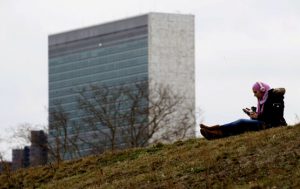
“A recession is in prospect. The question is: how long it will last and how much damage will it do to the productive capacities of our economies and the livelihoods of our citizens,” Guterres said.
By the end of the year, the secretary-general said “the cost of this pandemic is likely to be measured in the trillions of dollars” and that’s why the G20 leaders “must inject massive resources into economies, reaching double digit percentage points in the world’s gross domestic product.”
He said a coordinated stimulus package in the trillions of dollars “would include scaling up cash transfer measures, social protection, tax abatement, fiscal stimulus, low interest rates, access to credit, insurance and wage support schemes.”
The secretary-general stressed that “these expansionary policies must be accompanied by a clear repudiation of protectionism.”
“I urge G-20 leaders to commit to ban tariffs, quotas or non-tariff measures, and remove restrictions on cross-border trade that affect the deployment of medical equipment, medicines and other essential goods to fight the epidemic,” Guterres said.
He also encouraged countries to waive sanctions to allow delivery of food, health supplies, medical equipment and support for the COVID-19 crisis, saying: “This is the time for solidarity not exclusion.”
Guterres also called on the G20 leaders to establish a coordinated response to suppress the coronavirus everywhere, guided by the U.N. World Health Organization,.
He said this would provide countries with strong capabilities to stop transmission of COVID-19 including testing, tracing, quarantining, treating the sick, coordinating measures to restrict movements and contacts and coordinating scientific collaboration in the search for a vaccine and treatments.
Guterres said the U.N. supply network is at the G20’s disposal to help procure medical and protective equipment and establish transport and supply chains.
He also stressed the responsibility of all nations to “recover better” from the pandemic and ensure that future development programs contribute to preserving the environment and addressing climate change.
____
Newsroom | theworldmail.co.uk
Source/Contribution/Photo Credit by Associated press




